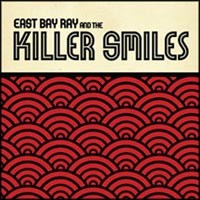For years, the punk community has been challenging East Bay Ray to deliver new material. On the group's debut, Ray and gang accept the challenge and deliver Ray's best work in over 25 years.
Although it's been some time since Dead Kennedys guitarist East Bay Ray has released new material, and even longer since he released rock-based material, he opens his new band's self-titled debut showing he still knows how to do the thing that only he can do. The cliché often used in connection with Ray is that his work is based off early surf and rockabilly riffage. But clichés are clichés for a reason, and the influence of rock's original raftsmen plays a heavy part in establishing the album's sound.
But, here, Ray isn't merely aping the chords of the original rockers. Rather, as with his best work in the DKs, he somehow adds a menacing edge to his sound that is as ominous as it is unsettling, despite the clean tone. This combination makes the music feel almost as though it could sit as the backdrop for a '50s B-horror and make the comic gore on screen seem wretch-inducing.
While the record does make it clear that Ray is the reason why we're here, it's not purely a Ray show. Skip McSkipster, also of the Wynona Riders, sings in a cross between '90s pop-punk brattiness and classic pop (read: Sinatra/Martin/Davis) crooning. Between the clean guitar ringing and McSkipster's clean vocals, the music seems to flip between classic punk and James Bond theme-style slickness. Interesting, though, a few of the songs, including a cover of "16 Tons", feature a heavy country influence. "The Heart Is Something" has an understated piano and Ray's steel guitar that could make it easily fit on a modern country album and not many would feel it was out of place.
Throughout the album, the group touches more on socio-politics than traditional political ranting. "You're Such a Fake" accuses an unnamed agitator of being all talk and no action. "I'm a User" traces the life of a bullied kid into his adulthood of selfishness. "It's Broken" comments on how modern society in general is breaking down. While the conviction the group has gives the band its driving energy, the lack of pure outrage or any humor in the attacks sometimes makes them feel limp.
Throughout the album, Ray echoes the spidery wavering of Plastic Surgery Disasters, probably his finest hour, with seeming ease. If he's able to deliver with this caliber naturally, the question is, what took him so long?
